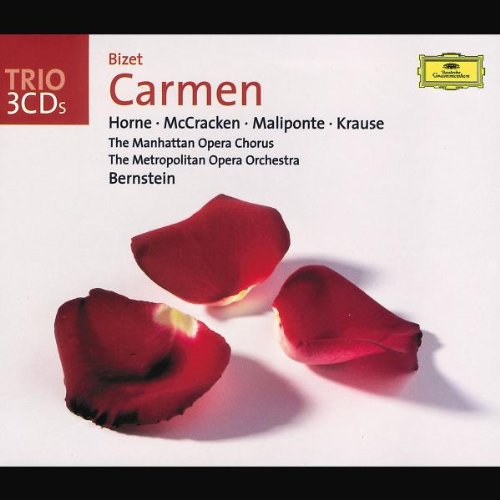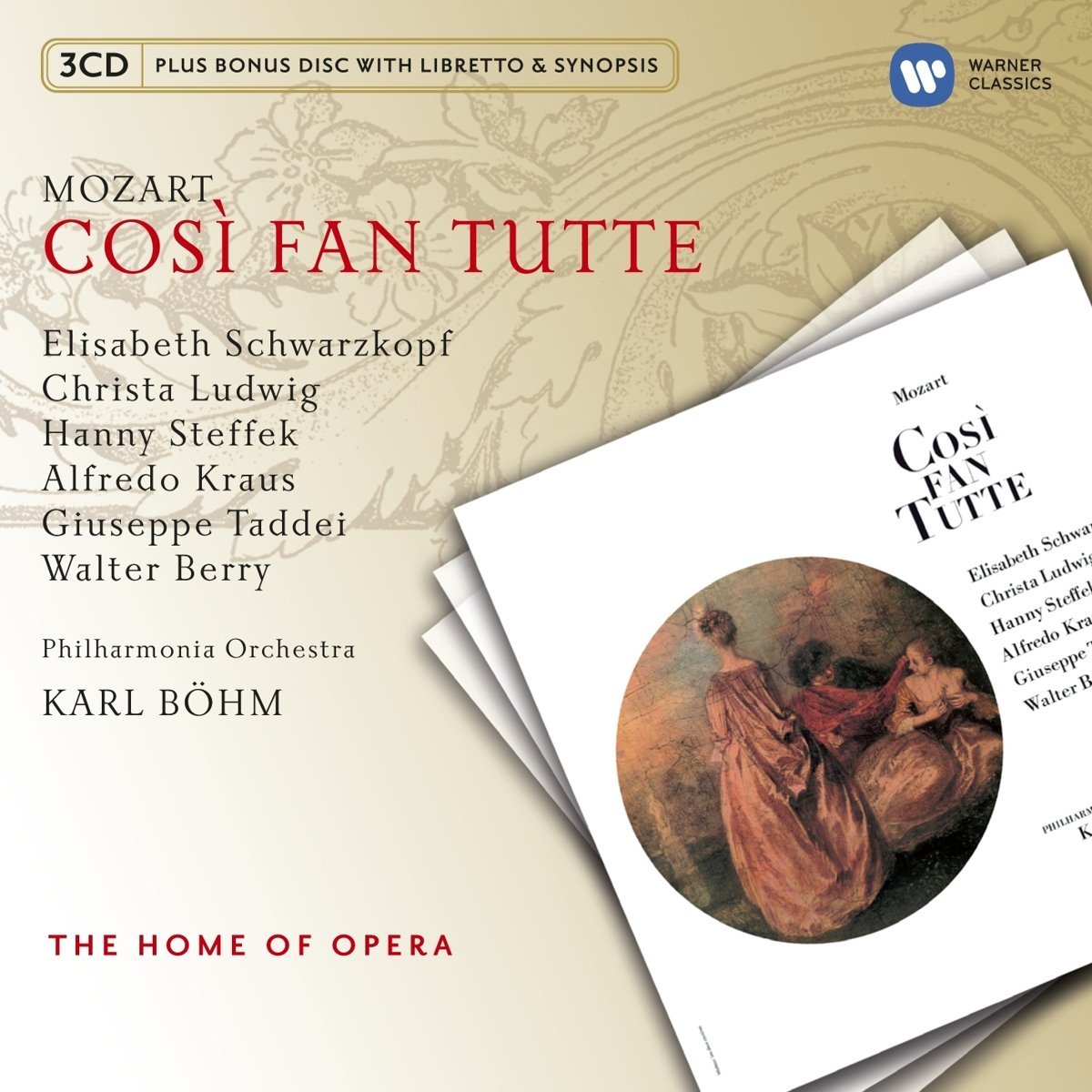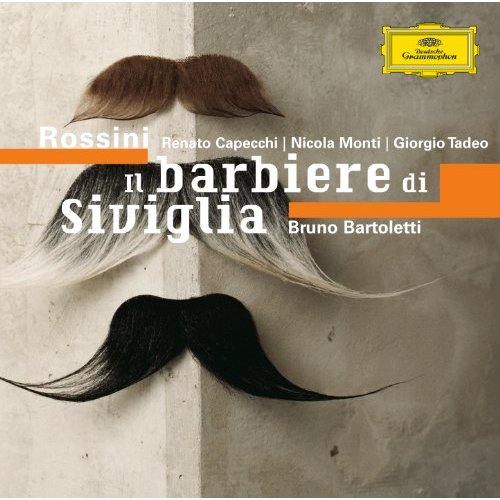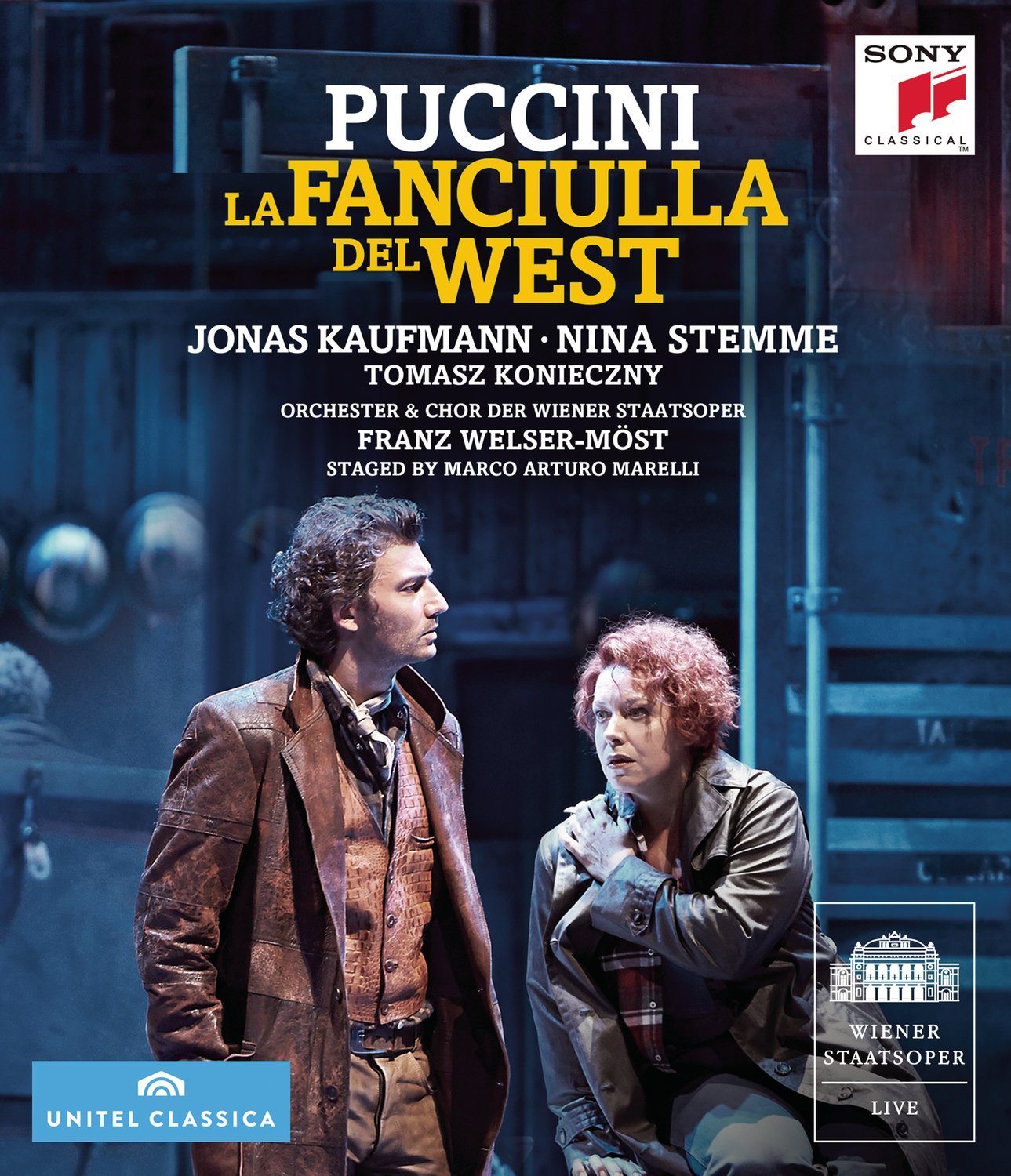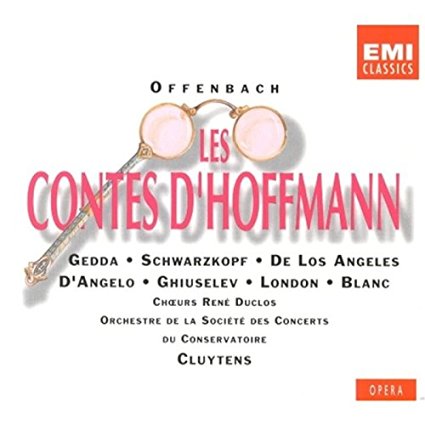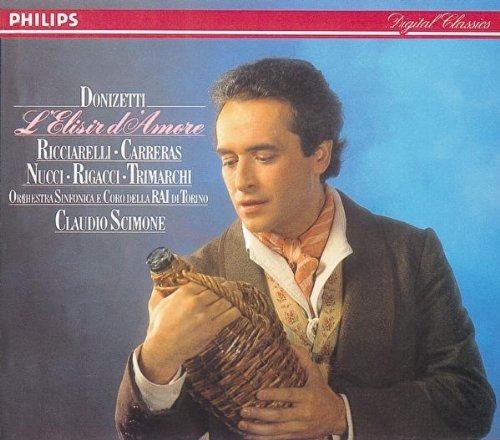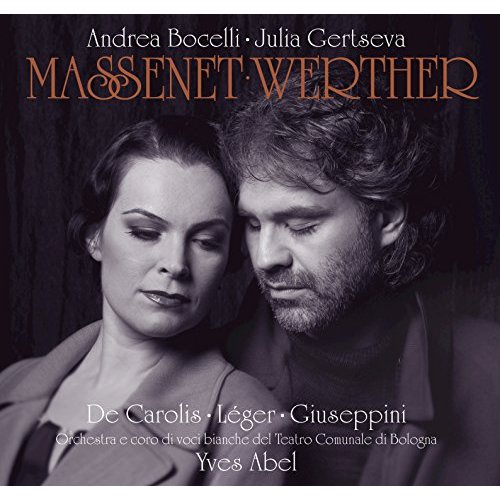Opera: L’Elisir d’amore (The Elixir of Love)
Composer: Gaetano Donizetti
Other popular works by this composer: Lucia di Lammermoor, Don Pasquale
First performed: 1832
Language: Italian
Accessibility Level: Beginner Explorer Aficionado
Setting: Late 18th-century Spain/France
Plot: A lovesick peasant buys a love potion from a snake oil salesman to win over his beloved, unaware that it is simply wine
Highlights: Quanto è bella, Una furtiva lagrima
Recommended audio recording/s: Banks/Plazas/Holland/Shore/Parry [in English]; Pavarotti/Sutherland
; Carreras/Riccarelli
Recommended video recording/s: Villazon/Netrebko
Rating (1 to 5): ![]()
![]()
![]()
![]()
![]()
Donizetti’s operas, of which he wrote over seventy, do not generally rank in my list of favorites. In all honesty, however, I’ve only casually listened to a few of the more famous ones, so I still keep an open mind. There are lots more to explore (and we’ll cover many of those in the weeks – and years – ahead). Furthermore, at times you’ll like operas right away, on first listening, and other times they grow on you with repeated listening and as your sophistication level increases. They can be like fine wine. And, speaking of wine, it has a prominent role in this story.
I liked the opera immediately. In fact, I loved it. It has a lot of infectious, lively tunes, one ultra-famous, heartbreaking one and lots of choral interjection, which I always love. It is an opera buffa, or comic opera (think “buffoon”), and as such is a lot of fun to listen to. What’s more, the story is both touching and relatable, unlike many operas that have bizarre or overly melodramatic plots. Donizetti wrote this opera in only six weeks, and wisely added its most famous number after the original drafts were complete. It is one of the twenty most performed operas in the world.
The music in this opera reminded me very much of that of Rossini – not surprising, considering it is from the same time period and has a madcap plot not unlike Rossini’s Barber of Seville. In fact, only a few years prior to this opera being premiered, Rossini had just finished writing his last one (William Tell). Here, Donizetti picks up his mantle, with enormous success (and with more than a few similarities to his forebear’s work).
I highly recommend listening to this opera sung in English first. This is always good advice as it helps with understanding the plot, but especially so when the story is so much fun to follow (with some operas, you’re better off not knowing the convoluted and ridiculous plot!) It also happens that the recording of this opera in English, pictured above, is of excellent quality (for an original-language (Italian) recording there are several good choices, including those sung by Pavarotti
and Carreras
). Andrew Shore, who sings the role of Dr. Dulcamara (the love potion hawker) in the English-language version, is wonderfully demonstrative and emphatic (check him out in the English-language Barber Of Seville
and Don Pasquale
as well).
Now, on to the Three’s Company-worthy plot:
Nemorino, a poor peasant, is in love with Adina, whom he perceives to be out of his league – she’s educated and wealthy, both of which he is not. Adina is indifferent to his affection, and is also being pursued by the soldier Belcore. She’s not really interested in him, either, and prefers to play the field. She’s a free spirit, she is.
The opera opens with a jaunty tune sung by the peasants, extolling their simple village life. Nemorino then spies Adina, and sings of his love for her in the tenor standard Quanto e bella (“she’s so beautiful”):
Enter Belcore, the soldier, who also woos Adina with his own (less famous) aria, after which the whole cast sings a highly energetic number that slowly builds to a frenetic pace. This, more than anything, reminded me of Rossini, employing a technique he used to build excitement in a song by gradually increasing its tempo and volume.
“Doctor” Dulcamara makes his grand entrance next, rolling his cart of potions and magical cures behind him (again, I am reminded of Fiagro’s similar entrance in The Barber of Seville, cart and all). Dulcamara brags of his ability to cure any and all ills with his mysterious concoctions. This, of course, gives the lovesick Nemorino an idea. He pays all the money he has for a “love” potion, which is really nothing but alcohol. The “doctor” tells him it takes twenty-four hours to take effect, which, in reality, allows him to leave town before Nemorino discovers he’s been swindled. Nemorino takes a couple of swigs and starts to feel giddy. Adina walks by but he ignores her, afraid to interact with her before he gets the full effect of the potion. She takes this as a snub, and seems a bit . . . disappointed. She may have feelings for Nemorino that she does not admit to.
Belcore returns asking Adina to marry him (things happen quickly in opera plots!). She agrees to do so in six days time, just to spite the suddenly indifferent Nemorino, having no intention of following through. Nemorino overhears the proposal but is unconcerned, confident that his potion will make Adina his in just one day, not six. However, when Belcore is given military orders to leave the next day, Adina agrees to marry him right away, and Nemorino is now very concerned. He sings a plaintive aria (Adina Credimi) pleading with Adina to wait just one more day. Adina and the villagers join in for a rousing finish. Here it is sung by Luciano Pavarotti:
Adina is unmoved and determined to continue with her plans, however, and Act 2 opens with a jaunty wedding feast:
When Adina sees that Nemorino is not present, she delays the nuptials until evening (she’s apparently got it for him bad, as much as she desperately tries to make him jealous!) Nemorino is beside himself, and begs the doctor for more potion, but he has no money. He therefore agrees to enlist as a soldier to earn an immediate signing bonus. Meanwhile, unbeknownst to him, Nemorino’s uncle has died and left him a fortune (I told you this was like a Three’s Company plot!) Also, Adina discovers that Nemorino bought the potion from the doctor to win her love and she now feels remorse for treating him badly.
Nemorino walks on stage alone to sing this opera’s greatest number, and, indeed, one of opera’s greatest tenor arias. Surely it is the greatest one that Donizetti penned: Una furtiva lagrima (one secret tear – a reference to Nemorino’s realization that Adina loves him after all when he witnesses her shed a tear for him). While I’ve always loved Pavarotti’s treatment of this aria, I was blown away when I heard Mexican tenor Rolando Villazon sing it on his DVD performance from 2006, which I very highly recommend. It is funny, playful, and extremely well sung and acted. Villazon is incredibly versatile – he is like Rowan Atkinson’s Mr. Bean character with his comical contortions and facial gestures, and he even juggles on stage while singing. The audience gives him a thunderous and warm ovation (twice!) after his famous aria, and demands an encore. It’s a joy to watch, and we have to wonder if he is in or out of character while he bashfully absorbs the audience’s earnest admiration:
Adina gets Nemorino out of his military contract and begs him to stay. She finally and passionately admits her love for him and vows to love him forever. Dulcamara declares his love potion a smashing success (not only does it make you fall in love, but rich, too!), and Sergeant Belcore takes his loss in stride, declaring there are plenty of other women to marry. The transformation in the two main characters in the Villazon/Netrebko video performance is incredibly heartwarming and gets a long, enthusiastic ovation in the final scene. It is wonderful to see such chemistry and authenticity between two principals, and it’s an opera that has a rare happy ending. L’elisir d’amore – an elixir to make you fall in love – with opera!
(I apologize for the foreign subtitles – copyright laws prohibit the American/English version from being posted online).
I found it curious that during the bows, two male performers were thrown flowers (those playing Belcore and Dulcamara), but not the female (Netrebko) or male lead (Villazon)!

The Villazon/Netrebko DVD

The Pavarotti CD

The Carreras CD


